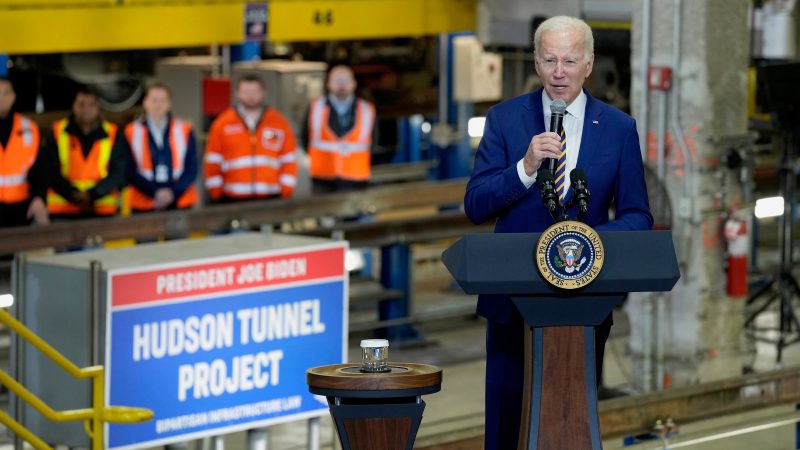
Biden approval ratings remain well underwater, far below most recent presidents
President Biden was on the road for a second straight day Tuesday highlighting the benefits of the bipartisan infrastructure law, one of the top domestic achievements of his tenure so far in the White House.
‘This law is the most significant investment in rail… since we created Amtrak,’ the president touted at the West Side Rail Yard in New York City Tuesday, as he promoted a project — paid through the infrastructure measure — that’s expected to improve reliability for hundreds of thousands of train passengers per day in the northeast.
‘When the project is complete, trains will be in and out of New York more quickly, more safely, with fewer interruptions,’ Biden emphasized.
But as Biden moves closer towards the likely launch of his 2024 presidential election campaign, his standing in the most important metric of his presidency remains well in negative territory.
The president’s approval/disapproval rating is underwater at 43%-53%, according to an average of the most recent national polls compiled by Real Clear Politics.
Biden’s approval rating hovered in the low to mid 50s during his first six months in the White House. But the president’s numbers started sagging in August 2021 in the wake of Biden’s much criticized handling of the turbulent U.S. exit from Afghanistan and following a surge in COVID-19 cases that summer among mainly unvaccinated people.
The plunge in the president’s approval was also fueled by soaring inflation, which started spiking in the summer of 2021, and to a lesser degree the surge of migrants trying to cross into the U.S. along the southern border with Mexico. The president’s numbers slightly rebounded last summer and autumn, but remain well in the red.
Biden stands far below where his three most recent two-term predecessors stood at this point in their presidencies, as they successfully ran for re-election.
Democratic President Barack Obama enjoyed a 51%-43% approval rating at the end of January 2011, according to a Real Clear Politics average. Obama’s Republican predecessor, President George W. Bush stood at 59%-35% at the end of January 2003, according to Real Clear Politics. And Democratic President Bill Clinton was above water at 49%-44% at the beginning of February 1995 according to Gallup polling.
The only recent president whose approval ratings were lower than Biden’s current numbers was his most recent predecessor — Donald Trump.
Then-President Trump stood at 41%-55% at the end of January 2019, according to the Real Clear Politics average. Trump was defeated by Biden in his bid for a second term in the White House.
The further polarization of the electorate in recent years is a major factor in both Biden and Trump’s negative numbers, says Lee Miringoff, director of the Marist Institute for Public Opinion.
‘There was a time when an incumbent president received a decent share of the opposing party’s support. Now it’s single digits at best,’ Miringoff said. ‘Presidents are getting very little nowadays from across the partisan divide.’
But Biden’s negative numbers weren’t a drag on his party in November’s midterm elections, as the Democrats defied expectations and held onto the Senate, suffered lower-than-expected losses in the House, and made gains in the battle for governorships and state legislatures.
If Biden’s approval ratings remain in the low to mid 40’s into next year amid a likely re-election campaign, he could face problems.
‘If you’re upside down, you want to make it a choice between yourself and your opponent,’ Miringoff emphasized. ‘If it comes to be a referendum on your first term, and people think the country’s headed in the wrong direction and your numbers are mired in the low 40’s, then that becomes a problem.’
But the president next week will have an opportunity to try and boost his standing with Americans as he delivers the annual State of the Union address.
‘If President Biden is looking for an opportunity to alter a mostly static approval rating, the State of the Union, is his next best chance,’ Miringoff said. ‘Biden needs to flip public sentiment about the strength of the union and find middle ground to offset many Americans who view the political parties as extreme.’
